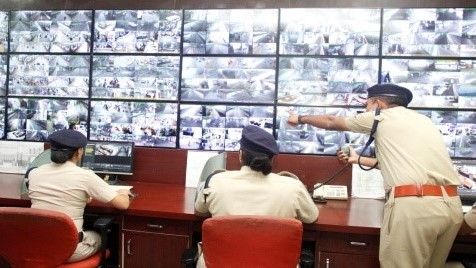
Suburban railway systems, often referred to as the lifeline of metropolitan cities, serve millions of passengers daily and form the backbone of urban connectivity. However, the vast scale and complexity of these networks pose significant safety and security challenges. For instance, the Mumbai suburban railway network, one of the busiest in the world, carries over 7 million passengers daily, making its security operations highly demanding. At the forefront of addressing these issues is the Railway Protection Force (RPF), a specialized unit committed to ensuring the safety of passengers and railway infrastructure. While the challenges are substantial, the RPF’s innovative strategies and adoption of advanced technologies have made commendable progress toward enhancing security for suburban commuters.
The primary challenge lies in the sheer density of the suburban railway system. Mumbai’s suburban railway network carries nearly 35 lakh passengers over Western Railway and more than 37 lakh passengers over Central Railway daily. This level of activity creates an environment where overcrowding is inevitable, particularly during peak hours. Overcrowded trains and congested platforms are not just inconvenient but also create fertile ground for petty crimes such as pickpocketing, chain snatching, and harassment. Additionally, incidents involving “fatka” gangs, who exploit slow-moving trains to snatch passengers’ valuables, exacerbate the problem, often leading to injuries or fatalities as passengers fall from moving trains.
For female commuters, the risks are heightened. Overcrowded conditions, even in women-only coaches, frequently lead to instances of harassment, pickpocketing, and emotional distress. Ensuring their safety requires vigilant monitoring and systemic efforts to address broader issues of overcrowding and inadequate space. In 2024, more than 13,000 offenders traveling in ladies’ coaches were apprehended, and fines amounting to over ₹29 lakh were realized in the Mumbai suburban section.
Another pressing concern is the persistent threat of terrorism. Suburban railway systems are vulnerable due to their open access and high passenger volumes. The 2006 Mumbai train bombings serve as a grim reminder of the catastrophic potential of such attacks. The evolving nature of crime in the digital age further complicates matters. Cyberattacks targeting ticketing systems, the misuse of social media to incite violence, and the introduction of sophisticated weaponry demand dynamic and multifaceted security responses. Trespassing and other untoward incidents represent another significant challenge. In urban areas where railway tracks intersect residential zones, many individuals resort to crossing tracks or entering restricted zones, leading to tragic fatalities. In 2024, more than 3,500 untoward cases (deaths and injuries) were reported.
Railway security is not solely the responsibility of the RPF. The force collaborates with local police, intelligence agencies, anti-terrorism squads, and other law enforcement organizations. However, gaps in communication and the absence of streamlined protocols often impede prompt responses to security threats. In rapidly evolving situations, such as terrorist attacks or criminal incidents, delays in coordination can significantly worsen the situation.
Despite these challenges, the RPF has introduced several innovative measures to enhance security. Advanced technology plays a crucial role in these efforts. The installation of Closed-Circuit Television (CCTV) cameras at stations and on trains has significantly bolstered surveillance capabilities. These systems, integrated with real-time monitoring, enable the RPF to detect and respond to suspicious activities promptly. In 2024, a total of 1,924 cases were detected, and 1,955 offenders were apprehended in the Mumbai suburban section, with 424 cases solved using CCTV, leading to the apprehension of 438 offenders. Facial recognition technology, powered by artificial intelligence, further enhances security by allowing real-time identification of known offenders and missing persons. In 2024, 31 offenders were apprehended using facial recognition in 29 separate cases.
Digital tools have also empowered passengers to play an active role in their own safety. To combat fraud and reduce congestion, many suburban rail networks have adopted smart ticketing systems, including digital ticketing, e-payment systems, and contactless cards. Drones have been deployed to monitor large crowds and hard-to-reach areas, providing broader surveillance capabilities. Platforms such as the "Railway Helpline" (139) and the "Rail Madad App" allow commuters to report incidents directly, ensuring faster responses and fostering a stronger connection between passengers and authorities.
The RPF has implemented several targeted operations to enhance railway security. Specialized Anti-Theft Squads operate in plainclothes, blending with passengers to identify and apprehend criminals effectively, significantly reducing theft cases. Data-driven policing enables the RPF to identify crime-prone areas and times for efficient resource allocation. Integrated Security Systems (ISS) at sensitive stations combine electronic surveillance, access control, and other advanced features to improve overall safety.
Focused initiatives such as Operation Yatri Suraksha target theft and robbery through regular patrols. Under Operation Amanat, RPF actively returns lost passenger belongings; in 2024, valuables worth over ₹6.67 crore were returned to around 2,200 rightful owners. Operation Jeevan Raksha highlights the RPF’s commitment to welfare, with personnel saving 42 lives in the Mumbai suburban section in 2024. Operation Nanhe Faristey rescued 587 children with follow-up care in collaboration with Child Welfare Committees and NGOs.
Women’s safety initiatives include “Meri Saheli,” where RPF personnel engage directly with female commuters. Under Mission Matra Shakti, the RPF assisted eight pregnant women in the Mumbai suburban section in 2024. Mission Sewa supports vulnerable passengers, including the elderly and differently-abled. Operation Aahat addresses human trafficking, rescuing victims and apprehending offenders.
Community policing has become a key component of suburban railway security, with RPF fostering collective responsibility by engaging local communities. In a unique effort to raise awareness, the RPF participated in the Mumbai Marathon 2025, promoting safety messages alongside fitness.
Looking ahead, the RPF plans to expand CCTV coverage, adopt AI-powered monitoring for crowd management, increase women personnel deployment, and conduct public awareness campaigns. The RPF’s dedication to innovation and collaboration underscores its commitment to making suburban railways safer and more efficient for millions of daily commuters.
Written by Ajoy Sadany, IG cum PCSC/RPF/Western Railway